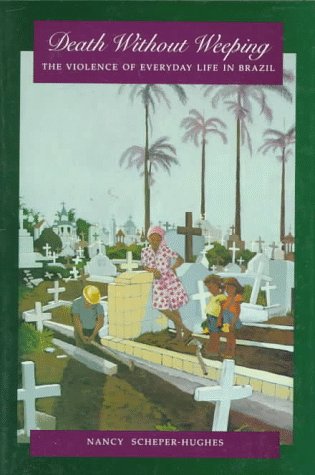
Brazil RPCV Nancy Scheper-Hughes writes "Death without Weeping"
Death Without Weeping: The Violence of Everyday Life in Brazil
by Nancy Schepre-Hughes
University of California Press
Released: 01 September, 1993 - ISBN: 0520075374
Paperback
Related Items:
Top Customer Reviews
Rating: 2 (out of 5)
Summary: Routina
Comment: This book doesn't tell us anything we don't already know. Also it tries to interpret events. Anybody with internet access can read about favelas of Rio and the "parallel government" that rules the shanty-towns.
In fact, at least two groups in Rio give tours of these slums. And you will find things quite peaceful (the tour operators have not been injured in over 15 yrs of giving tours).
In a word: it's all about (drug) money.
Rating: 4 (out of 5)
Summary: Not for the faint of heart
Comment: Scheper-Hughes's book is certainly the most impacting book I have read in months. I cannot call it entertaining but it is riveting in presenting a mind-boggling situation of abject poverty in Northeastern Brazil with its consequent infant and child mortality and impacts on the family structure.
Death Without Weeping is a very original, very relevant, and carefully written book although not perfect. The book is the result of extensive field research by Dr. Scheper-Hughes, Professor of Anthropology at the University of California at Berkeley but nevertheles very readable. I could understand and enjoy most of it without having had extensive training in Anthropology.
The author does a wonderful job in translating Alto do Cruzeiro reality into something the average American can understand. This "translation" certainly adds a bias but is still indispensable in my opinion. I consider that the author's religious beliefs strongly affected the outcome of the book and that I think could have been avoided.
I understand that the author has it's ethics and wouldn't reveal in the text the actual location name for Bom Jesus da Mata. I'm not tied by the same ethics so I can tell it: Bom Jesus da Mata is actually Timbauba, a 60,000 inhabitants town on the outskirts of Recife. The book subtitle, "The Violence of Everyday Life in Brazil" couldn't be worse. Timbauba is not Brazil. It has its own very specific problems and to read the book without understanding the great diversity among Brazil's regions would be very unfair to the country. Even in a local scale, Alto do Cruzeiro is not Timabuba and Timbauba is not Pernambuco. If you read the book don't rule out the possibility of going down to Brazil and having a wonderful time there. Tourism is a very good way of alleviating if not solving the problems presented in the book.
I have read now dozens of books written in English by the so-called Brazilianists who most of the times are not Brazilians themselves. Most of the books have the same problem of Death Without Weeping: there's a total sloppiness in spelling the Portuguese words. I can't believe UC Berkeley couldn't hire a Brazilian graduate student to proofread the originals. Moreover, the Geraldo Vandre quote on the very first page of the book, which gives the book its name was completely fabricated. Disparada is a great song and for writing songs such as "Disparada" and "Para Nao Dizer Que Nao Falei Das Flores", Geraldo Vandre was captured and tortured by the military dictatorship in Brazil. He was later released but severely braindamaged. However, the verses Scheper-Hughes quoted do not exist in "Disparada".
I was shocked to learn on the book's Epilogue who Seu Jacques, whom the book is dedicated to, was. But this suspense I'm not going to break.
Leonardo Alves - Houghton, MI - October 2002
Rating: 5 (out of 5)
Summary: Scheper-Hughes At Her Very Best
Comment: I have seen death without weeping. The destiny of the Northeast is death. Cattle they kill, But to the people they do something worse. --Geraldo Vandre, Disparada
"Death Without Weeping: Violence of Everyday Life in Brazil" is a brilliant anthropological and sociological depiction of life in the Nordeste region of Brazil. In Death Without Weeping, Scheper-Hughes carefully analyzes the Mother-Child relationship in a region of Brazil with the highest infant mortality rate in Latin America. Centered in the village of Alto do Cruziero, Scheper-Hughes continues to work with the community she had first joined as a Peace Corps volunteer decades before. Rekindling her relationship with the villagers and the land, she takes a new perspective to study the emotional and physical strain on a region where every life is touched with the pain of infant mortality. She examines the frightening reality of a place where mothers have absolutely no safety net and cannot protect their children from the disease, hunger, and destitute living conditions.
Scheper-Hughes further discusses the role of international corporations and their influence (usually negative) in the Nordeste region.
Death Without Weeping is absolutely brilliant. Scheper-Hughes is at her finest, and her work is impeccable. This is one of the finest works of sociology and anthropology I have read.






